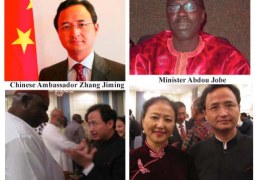Stakeholders from the higher education, tertiary and other relevant institutions are currently gathered at the Paradise Suites Hotel for a critical review of the draft national tertiary and higher education policy 2013-2022.
The two-day forum brought together partners, stakeholders, academics and other experts from diverse academic disciplines and walks of life to dialogue on the significance of tertiary and higher education policy in socio-economic development.
Speaking at the opening ceremony, Dr Momodou Tangara, minister of Higher Education, Research, Science and Technology, said the significance and expected impact and outcomes of the national event are so diverse and extensive that they can only be appreciated within the context of the current circumstances in comparison to the degree and level of degree, development, growth and socio-economic advancement to be registered in the years to come.
Dr Tangara told stakeholders that the volatility and unpredictable nature of the global context, which has direct consequence on our national circumstances and the need to continually respond and adapt to this ever-changing global stage, also make it necessary to formulate a new and appropriate tertiary and higher education policy.
This, he added, is by no means intended to ignore or downplay the neatly articulated and terse policy pronouncement in the 2004-2015 national education policy, which continued to legitimately guide the provision of education in the country until its review last year, when it was reoriented exclusively to guide the basic and secondary sector.
According to Dr Tangara, the policy will seek to support the development of important management functions for the improved performance of the higher education sector and the goal of the ministry is to provide equitable access to high quality and relevant tertiary and higher education that is responsive to local and global market needs.
He noted that the ongoing orchestrated global responses to the demand for higher education has put on the agenda issues of increased cross border production and utilization of new knowledge, modes of technologies, types and quality of service providers and of other factors that drive education, research, science, technology and innovation as key elements in the development formula for sustainable human progress and peace.
For his part, Jerreh Sanyang, deputy Permanent Secretary, admin and finance at the Higher Education Ministry, said the draft tertiary and higher education policy attempts to define from the perspective of the higher education sector the direction that must be taken, the choices that have to be made and the strategies to implement to realize our dreams; and the need for the formulation of a comprehensive and realistic tertiary and higher education policy arose with the creation of the Ministry of Higher Education, Research, Science and Technology in 2007.


